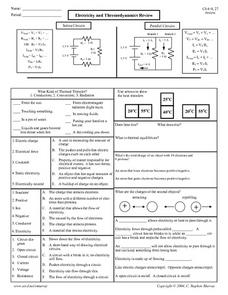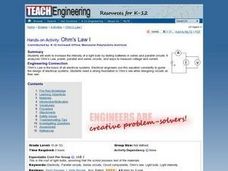Curated OER
Circuit Diagrams: Switching Circuits
Use a lab sheet on circuit diagrams in your electricity unit. Fifth graders draw two series circuits with diagrams, based on two examples. A science experiment prompts learners to use 3x5 cards to illustrate the way a series circuit works.
Curated OER
Series DC Circuits
In this electrical worksheet, students answer a series of 27 open-ended questions pertaining to DC circuits by analyzing electrical schematics. This worksheet is printable and there are on-line answers to the questions.
Curated OER
Electrical Circuits
Students compare series and parallel circuits. In this electricity and circuits lesson, students roleplay as a "wire" passing an energy ball to demonstrate how a series circuit works and how the circuit can be broken. Students construct...
Curated OER
Basic Ammeter Use
In this ammeter worksheet, students answer eleven questions about ammeters, multimeters and types of circuits. They identify different types of circuits given schematic diagrams.
Curated OER
Series and Parallel AC circuits
In this AC circuits learning exercise, students answer 75 questions about series and parallel circuits including building and analyzing their own circuit mathematically, interpreting schematics of AC circuits and finding total impedance...
Curated OER
Circuit Boards
Learners explore circuits. In this electricity science instructional activity, students build a circuit board after viewing a related PowerPoint presentation. Detailed instructions are included.
Curated OER
Series and Parallel Circuits
Fourth graders explore electrical circuits. In this electrical circuit lesson, 4th graders research the history of the use of light and read a biography regarding Benjamin Franklin. Students the build basic circuits, series circuits and...
Curated OER
Electricity and Thermodynamics Review
In this electricity and thermodynamics worksheet, students review the major concepts of both series circuits and parallel circuits, they review types of thermal transfer, they match electricity terms with their definitions, they fill in...
Curated OER
Types of Circuits and Ohm's Law
For this circuits an Ohm's Law worksheet, students read about the differences between series and parallel circuits. They are given Ohm's Law and the definitions of current, voltage and resistance. Students match variables with their...
Curated OER
Ohm's Law I
Students work to increase the intensity of a light bulb by testing batteries in series and parallel circuits. They analyze Ohm's Law, power, parallel and series circuits, and ways to measure voltage and current.
Curated OER
What Are Static and Current Electricity?
In this electricity worksheet, students will complete a Venn diagram comparing and contrasting the characteristics of series and parallel circuits.
Curated OER
Series/Parallel Circuits
Young scholars engage in a lesson that is concerned with the concept of series and parallel circuits. They conduct research using a variety of resources. They have class discussion and the lesson includes information for the teacher to use.
Curated OER
Please Turn Up the Lights!
Eighth graders discuss series and parallel circuits and design an investigation to test a hypothesis on total resistance of series and parallel circuits in combination. After discussion, groups design their experiments, run tests, and...
Curated OER
Batteries in Series
Eighth graders examine batteries in a series circuit and the associated voltage. They determine, through inquiry and problem solving, that the total voltage of batteries in a series is the sum of the voltage of each battery. They design...
Curated OER
Electrical Circuits - Current & Voltage in Series Circuits
Learners investigate the relationship between current and voltage in a series circuit. In this physics lesson, students measure the current across each light bulb. They predict what happens to the circuit if one bulb is blows out.
Curated OER
TE Activity: Ohm's Law 2
Students study Ohm's Law 2 after completing an activity about Ohm's Law 1. They determine how long it takes to charge a battery. They examine if it is better to use batteries in series or parallel circuits.

















